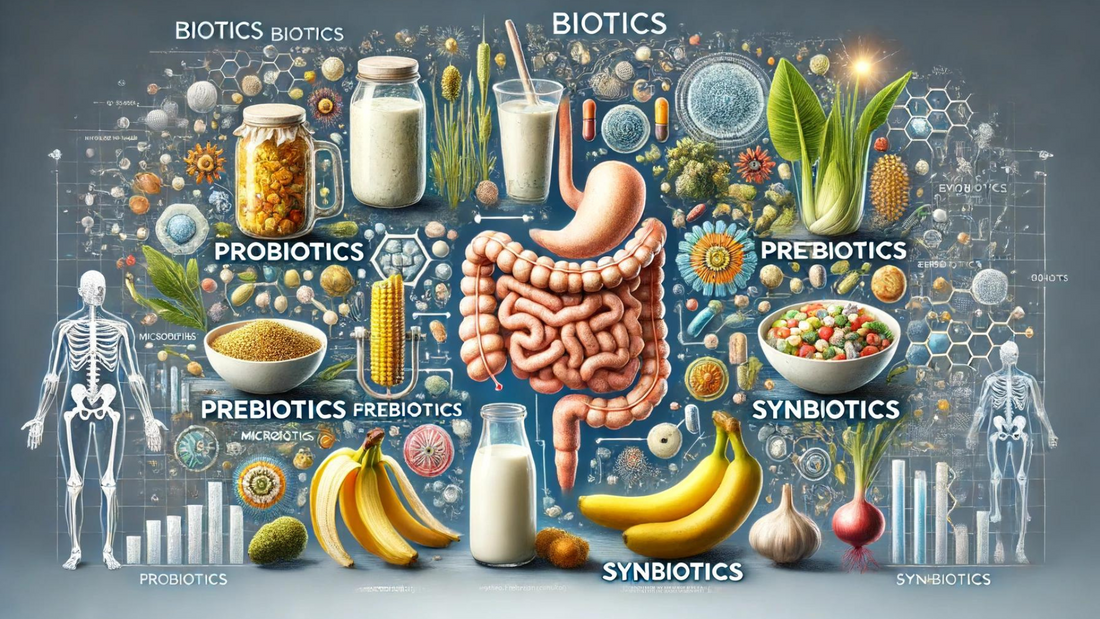
Unlocking Your Gut's Potential: The Pro, Pre, and Postbiotics Revolution
Share
Contents
- Intro: Meet Your Gut Team
- Probiotics: The Good Guys
- Finding Probiotics
- Why Probiotics Rock
- Prebiotics: Fuel for the Stars
- Where to Get Prebiotics
- Prebiotic Perks
- Postbiotics: The Clean-Up Crew
- Finding Postbiotics
- Postbiotic Benefits
- Demystifying the Differences
- Teamwork in Action
- The Science Behind It All
- FAQ
- Final Thoughts
- Disclaimer
Intro: Meet Your Gut Team
Your gut is more than just a food-processing factory—it’s a vibrant community bustling with life. Say hello to the unsung heroes: probiotics, prebiotics, and postbiotics. Together, they ensure your digestive system is in top shape (and have a little fun while doing it!).
Probiotics: The Good Guys
Probiotics are live, friendly bacteria that help maintain balance in your gut. They fend off harmful bacteria, ease digestion, and boost your immune system—think of them as your gut’s personal security team.
At a Glance:
| Strain | Source | Benefits | Food Examples |
|---|---|---|---|
| Lactobacillus | Fermented dairy | Boosts digestion, fends off infections | Yogurt, kefir |
| Bifidobacterium | Fermented foods & supplements | Supports immunity, soothes IBS symptoms | Tempeh, sauerkraut |
| Saccharomyces | Supplements | Helps with antibiotic-related diarrhea | Probiotic drinks |
Finding Probiotics
- Fermented Foods: Yogurt, kefir, kimchi, sauerkraut, and kombucha.
- Supplements: Capsules, powders, or liquids if you prefer convenience.
- Cheeses: Some cheeses carry live cultures—your favourite might be a hidden gem!
Why Probiotics Rock
They keep your gut balanced, boost immunity, and can even improve your mood. Probiotics work tirelessly behind the scenes to keep you feeling great.
Prebiotics: Fuel for the Stars
Prebiotics are non-digestible fibers that act as premium fuel for your probiotic buddies, ensuring they thrive.
Quick Overview:
| Type | Source | Examples | Benefits |
|---|---|---|---|
| Inulin | Chicory root, artichokes | Onions, garlic, chicory | Boosts calcium uptake, nourishes gut flora |
| Fructooligosaccharides (FOS) | Bananas, asparagus | Bananas, asparagus | Encourages good bacteria growth |
| Galactooligosaccharides (GOS) | Legumes, dairy | Beans, lentils | Enhances digestive and immune health |
Where to Get Prebiotics
- Fruits & Veggies: Bananas, onions, garlic, and asparagus.
- Whole Grains & Legumes: Barley, wheat, beans, and lentils.
- Specialty Foods: Chicory root is a prime source of inulin.
Prebiotic Perks
Feeding your gut’s good bacteria, prebiotics enhance digestion, improve nutrient absorption, and boost immune function.
Postbiotics: The Clean-Up Crew
When probiotics break down prebiotics, they produce postbiotics—beneficial by-products that reduce inflammation, energize colon cells, and strengthen your gut barrier.
The Lowdown on Postbiotics:
| Component | Origin | Examples | Benefits |
|---|---|---|---|
| Short-Chain Fatty Acids | Probiotic fermentation | Butyrate, propionate | Calms inflammation, energizes colon cells |
| Enzymes | Probiotic activity | Digestive enzymes | Improves nutrient breakdown |
| Bioactive Peptides | Metabolic by-products | Specific peptides | May support immunity |
Finding Postbiotics
- Fermented Foods: As your gut processes food, postbiotics form naturally.
- Supplements: Some products now include postbiotics for an extra boost.
- Natural Process: Your own digestion produces them.
Postbiotic Benefits
Postbiotics reduce inflammation, support a robust gut barrier, and energize digestive cells—keeping your gut balanced.
Demystifying the Differences
Here's the straight-up scoop:
- Probiotics: Live bacteria that maintain gut balance.
- Prebiotics: Fibers that feed the beneficial bacteria.
- Postbiotics: By-products that further support gut health.
Teamwork in Action
Imagine your gut as a well-rehearsed band:
- Prebiotics: Lay down the rhythm.
- Probiotics: Jam by breaking down fuel.
- Postbiotics: Provide the finishing touches.
When these elements harmonize, your digestion sings and your overall well-being gets a standing ovation.
Support Your Gut with Top-Notch Biotics
Give your gut the VIP treatment it deserves. Explore premium probiotic, prebiotic, and postbiotic products to keep your inner ecosystem thriving.
Explore Biotic CollectionsThe Science Behind It All
Our gut is a mini-universe teeming with microbes that interact in fascinating ways. Research shows a balanced microbiome improves digestion, boosts immunity, and influences mood. Investing in your gut health is a forward-thinking move for overall wellness.
Frequently Asked Questions
Q1: What's the best way to add probiotics to my diet?
A: Fermented foods like yogurt, kefir, and kimchi are excellent. Supplements with clinically verified strains are a good option too.
Q2: Can I mix prebiotics and probiotics together?
A: Absolutely! Known as synbiotics, pairing them maximizes their benefits.
Q3: Are there any side effects?
A: Most tolerate them well; mild bloating may occur initially but usually fades with time.
Q4: How soon will I notice improvements?
A: It varies—some see changes in days, others in weeks. Consistency is key!
Final Thoughts
Your gut is a powerhouse that deserves attention. Embracing the roles of probiotics, prebiotics, and postbiotics can transform your digestive health and overall well-being. A few mindful tweaks in your diet can lead to a happier, healthier you—so why wait?
Discover More Gut Health Products
Check out our premium biotic collections, crafted to support your journey toward optimal gut health.
Explore Biotic CollectionsDisclaimer
This article is for educational purposes only and should not be considered medical advice. Always consult with a healthcare professional before making any significant changes to your diet or health routine.
